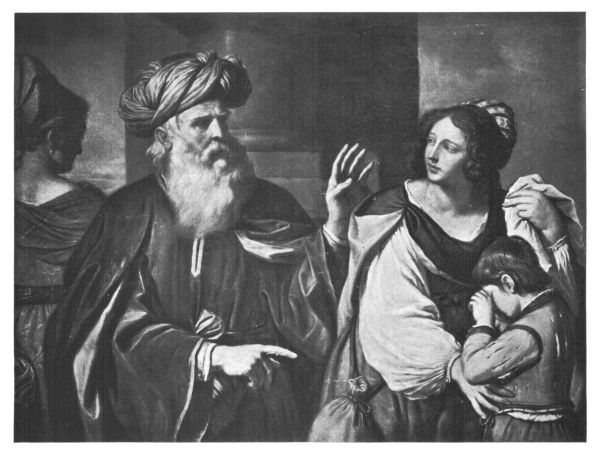
IN THE BRERA, MILAN
Hagar and Ishmael
Genesis 16
16 Now Sarai, Abram’s wife, had borne him no children. But she had an Egyptian slave named Hagar;2 so she said to Abram, “The Lord has kept me from having children. Go, sleep with my slave; perhaps I can build a family through her.”
Abram agreed to what Sarai said. 3 So after Abram had been living in Canaan ten years, Sarai his wife took her Egyptian slave Hagar and gave her to her husband to be his wife. 4 He slept with Hagar, and she conceived.
When she knew she was pregnant, she began to despise her mistress. 5 Then Sarai said to Abram, “You are responsible for the wrong I am suffering. I put my slave in your arms, and now that she knows she is pregnant, she despises me. May the Lord judge between you and me.”
6 “Your slave is in your hands,” Abram said. “Do with her whatever you think best.” Then Sarai mistreated Hagar; so she fled from her.
7 The angel of the Lord found Hagar near a spring in the desert; it was the spring that is beside the road to Shur. 8 And he said, “Hagar, slave of Sarai, where have you come from, and where are you going?”
“I’m running away from my mistress Sarai,” she answered.
9 Then the angel of the Lord told her, “Go back to your mistress and submit to her.” 10 The angel added, “I will increase your descendants so much that they will be too numerous to count.”
11 The angel of the Lord also said to her:
“You are now pregnant
and you will give birth to a son.
You shall name him Ishmael,[a]
for the Lord has heard of your misery.
12 He will be a wild donkey of a man;
his hand will be against everyone
and everyone’s hand against him,
and he will live in hostility
toward[b] all his brothers.”
13 She gave this name to the Lord who spoke to her: “You are the God who sees me,” for she said, “I have now seen[c] the One who sees me.” 14 That is why the well was called Beer Lahai Roi[d]; it is still there, between Kadesh and Bered.
15 So Hagar bore Abram a son, and Abram gave the name Ishmael to the son she had borne. 16 Abram was eighty-six years old when Hagar bore him Ishmael.
Footnotes
- Genesis 16:11 Ishmael means God hears.
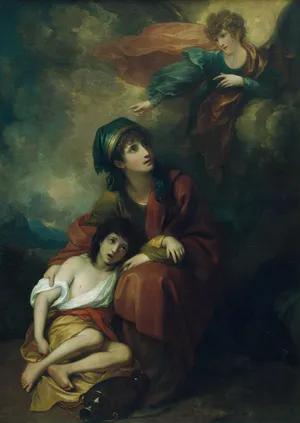
Hagar and Ishmael Painted by Benjamin West
“Ishmael, son of Abraham through Hagar, according to the three great Abrahamic religions—Judaism, Christianity, and Islam. After the birth of Isaac, another son of Abraham, through Sarah, Ishmael and his mother were banished to the desert. A minor figure thereafter in the traditions of Judaism and Christianity, Ishmael continued to play a foundational role in Islamic tradition, which holds that he settled in Mecca.” Britannica
GOD’S CARE FOR THE BOY ISHMAEL
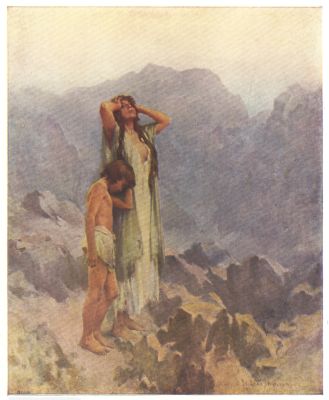
Painted by W. L. Taylor
Jehovah remembered what he had told Sarah, and he did as he had promised. So Sarah had a son, and when the child grew up, Abraham made a great feast on the day that he was weaned. But Sarah saw the son of Hagar the Egyptian and of Abraham playing with her son Isaac. And she said to Abraham, “Drive out this slave girl and her son, for the son of this slave girl shall not be heir with my son Isaac.” This request was very displeasing to Abraham because the boy was his son. But Jehovah said to Abraham, “Do not be displeased because of the boy and because of your slave girl. Listen to all that Sarah says to you, for Isaac only and his children shall bear your name. But I will also make of the son of the slave girl a great nation, because he is your son.”
Then Abraham rose early in the morning and took bread and a skin of water and gave it to Hagar; and he put the boy upon her shoulder and sent her away. So she set out and wandered in the desert of Beersheba. When the water in the skin was gone, she left the child under one of the desert shrubs and went a short distance away and sat down opposite him, for she said, “Let me not see the child die.”
The Well
While she sat there, the boy began to cry; and Jehovah heard the cry of the boy, and said, “What troubles you, Hagar? Fear not, for Jehovah has heard the cry of the boy. Rise, lift him up, and hold him fast by the hand, for I will make him a great nation.” And Jehovah opened her eyes and she saw a well of water. Then she went and filled the skin with water and gave the boy a drink.
And Jehovah cared for the boy; and when he grew up, he lived in the wilderness of Paran and became a bowman. And his mother secured a wife for him from Egypt.
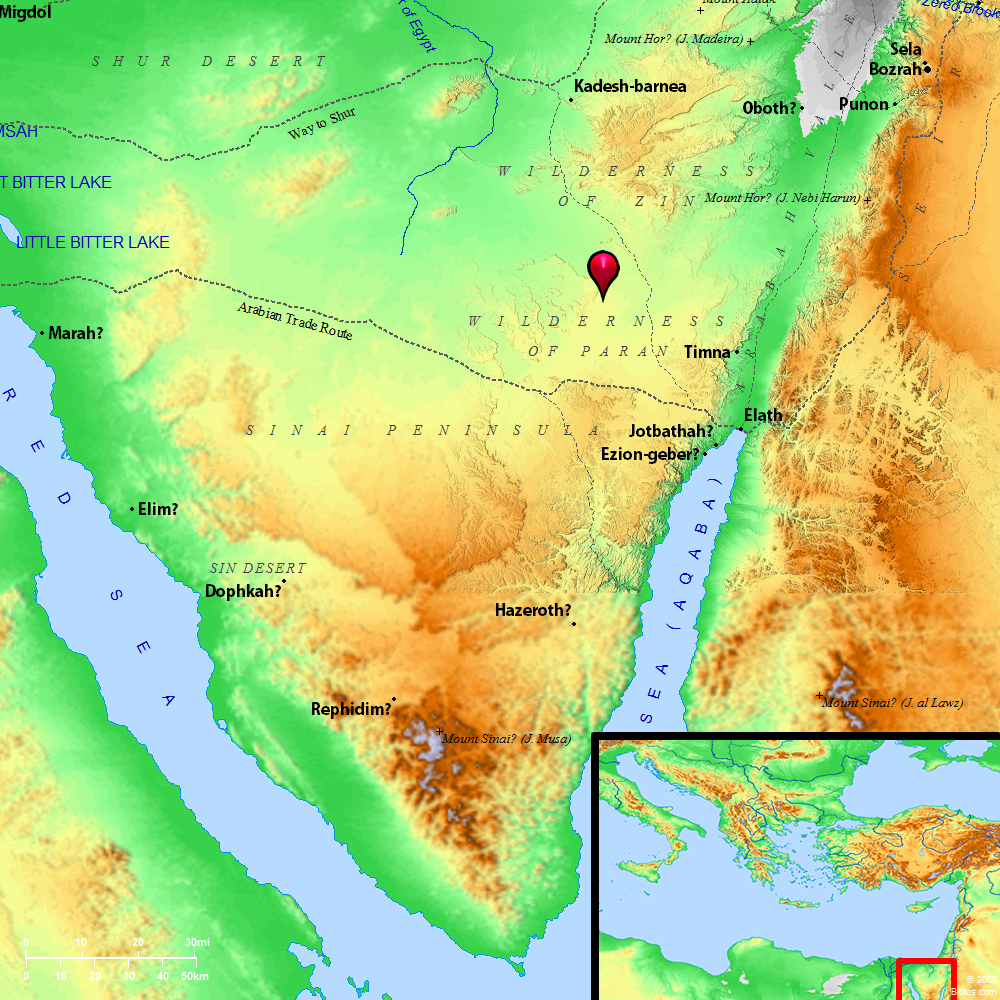
Image Creit: Bible Atlas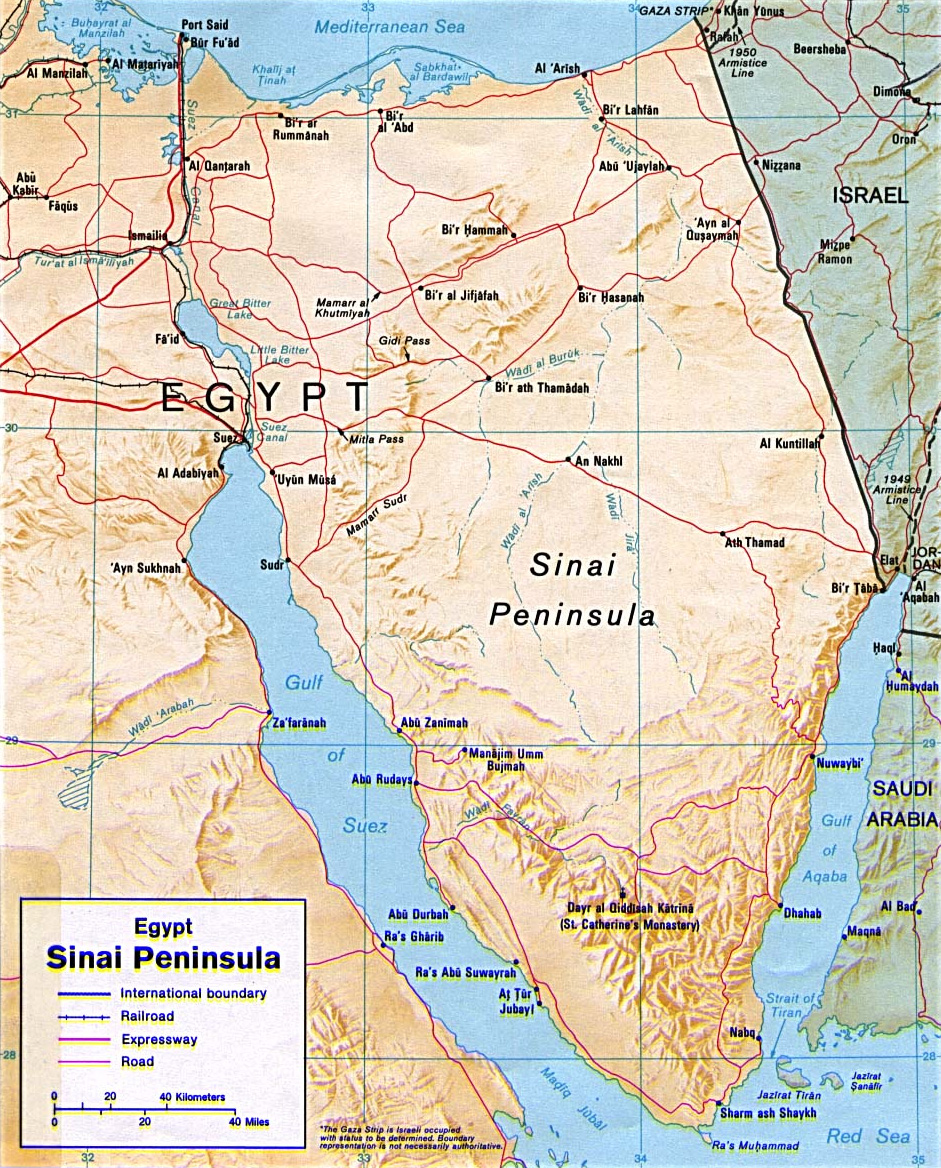
Image Credit: Wikipedia
“PARAN pâr’ ən (פָּארָ֑ן). A broad central area of desert in the Sinai Peninsula. It is to be distinguished from three smaller peripheral districts: the wilderness of Shur in the NW, bordering Egypt; the wilderness of Sinai, in the southern tip of the peninsula; and the wilderness of Zin, in the NE between Kadesh-barnea and the Arabah trough.
Consequently, there is some overlap in the rather vaguely defined boundaries of Paran. The whole area is some 23,000 square m.,…
“Paran thus has been associated with wild desert conditions of both relief and climate, astride the trade routes and also as an inhospitable refuge to those seeking isolation. It was the district settled by Ishmael (Gen 21:21) and crossed by the Israelites at the Exodus (Num 10:12; 12:16; 13:3-26). From it the Israelites sent their spies into Pal. (Num 13:26). David fled into Paran after the death of Samuel (1 Sam 25:1), possibly to the northern sector of the area, though the Gr. rendering in the LXX reads “wilderness of Maon.” El-paran, referred to as on the border of the wilderness (Gen 14:6), has been identified by some scholars with Elath, just N of Aqaba. Mt. Paran (Deut 33:2 and Hab 3:3) has been identified with Jebel M’aqrah, some twenty-nine m. S of ’Ain Qedeis. This is a guess for Mt. Paran could refer to any one of a number of prominent peaks in the mountains in the southern Sinai Peninsula.